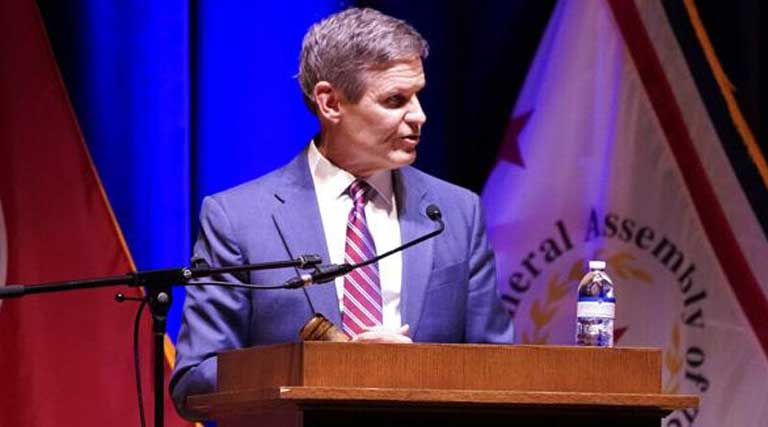Photo: Tennessee Gov. Bill Lee speaks to a joint session of the Tennessee Legislature at the start of a special session on education Tuesday, Jan. 19, 2021, in Nashville, Tenn.
Photo Credit: Mark Humphrey / AP
Published January 20, 2021
Attention across the state has been drawn to the quality of education in our community as COVID-19 has highlighted and exacerbated weaknesses in the system.
As families continue to adapt to the sudden, ever-evolving nature of American education in the 2020/2021 school year, sights were set on means for improvement.
The Education Week Research Center has developed measures to rank performance of districts across the nation, reporting on each state and offering comparative analysis.
States are graded and ranked in categories that are operationally defined as “Chance for Success” (measured in January), “School Finance” (reported in June), and “K-12 Achievement” (assessed in September).
Tennessee ranks 38th, 35th, and 40th respectively with an average “C” grade across the board for education quality according to their comprehensive national data.
Legislators continue to work tirelessly to negotiate solutions and recently announced a more vigorous approach to improvement.
On January 4th, the Tennessee Department of Education (TDOE) reported that in order to help support literacy in Tennessee, the state invested $60 million of one-time federal COVID-19 relief funding and $40 million in federal grant funding to launch “Reading 360.”
“When only 34% of Tennessee students are proficient or advanced readers by fourth grade – and that’s pre-COVID – something isn’t working and it’s time to get back to the basics,” Governor Bill Lee stated. “Reading 360 will give critical supports to districts and educators so we can address this challenge urgently and put Tennessee’s students on the right track to grow and thrive.”
Four days later, TDOE’s Commissioner Penny Schwinn announced another investment:
“The department is pleased to award the state’s six PBS stations $1 million to support the critical role our public television stations have played, especially throughout the COVID-19 pandemic, to engage families and provide access to educational resources and supports.”
TDOE reported working with Tennessee teachers and school districts, they created an in-home education series with over 300 instructional video lessons for 1st–8th grade students. These have been airing across all six Tennessee PBS stations since the spring and will continue to receive support from the state.
Less than two weeks after reporting the investment into PBS, Gov. Lee announced a bill that would further increase funding and further address reading proficiency by implementing programs that intend to assess previously reported literacy issues. The bill may also be interpreted as encouraging educators to hold struggling children back as early as third grade to prevent continued decline.
Lee’s plan additionally includes a two-year summer program costing $68 million, but this bill only includes funding for the first year. This has caused representatives to express concern that, if passed, it would mean taxpayers in local school districts will have to pick up the tab for the programs.
Despite these investments, enrollment is steadily dropping. A local teacher’s advocate stated that, “If we don’t recover the number of students we lost, whether next year, immediate or year after that, we’re going to lose money and we’re going to have to come up with additional dollars.”
Gov. Lee’s most recent special session proposed legislation that would provide all school-based employees with a one-time hazard pay bonus of 2% of their salary for the 2020-2021 school year. This is in addition to a proposed 4% increase in the upcoming year.
Ongoing issues are projected whether or not the temporary solutions proposed are implemented and legislation instated.
Unfortunately, the funding being poured into the educational system throughout our state to support virtual learning, has rightfully not quelled concerns.
In light of these most recent events, a welcome and pleasant but announcement came at the tail-end of Tuesday’s special session when Gov. Lee ultimately called for schools to do their best to return to standard, in-person learning.
“Here’s the bottom line,” Lee said. “You can’t say ‘follow the science’ and keep schools closed. You can’t say ‘I believe in public education’ and keep schools closed.”







2 Responses
Tennessee must remain vigilant in providing services while using tax dollars wisely. Are any of the sales tax dollars allocated to education? Is education funded in Tennessee through property taxes? Is there a resource where we can find a breakdown of the total funding…the percentages of federal funding, state funding, local funding, private donations, and any others?
In Carroll County a portion of sales tax and property tax goes to schools. I see a total lack of wise, prudent use of tax dollars. Throwing more money down that hole does not improve the quality of education. Problem I see, so much of “pandemic” money has gone to further sports, air conditioning in gyms, artificial turf for football field. Sports were restarted but in classroom education was not. When I was in school many moons ago, sports were extra-curricular activities not the main focus. Small county with 6 school districts. Lack of upkeep on facilities, districts want to build new facilities in 20 years. Just as present one is paid for. I attended school in building 50+ years old. Virtual learning, I witnessed one session, half of class time was consumed with taking role!